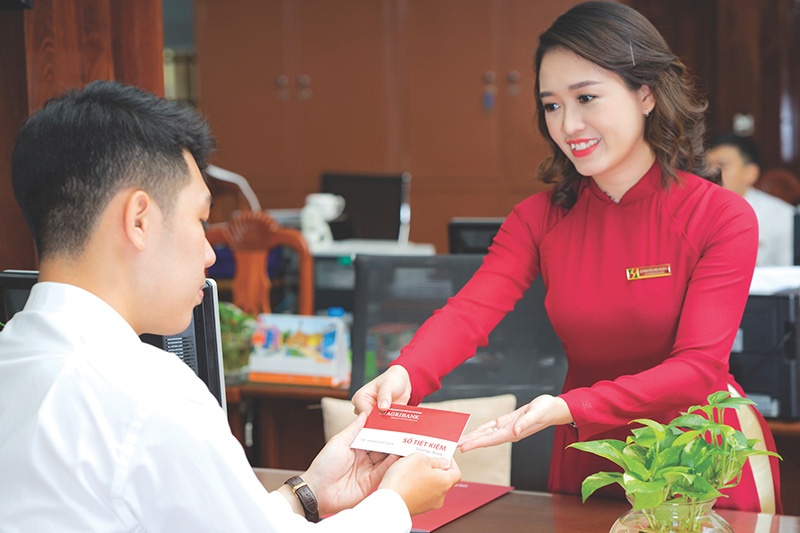Lenders advocating for improved charter capital mechanisms
 |
| Currently, Agribank is the only state-owned bank to be left behind in the initial public offering game, photo Dung Minh |
Southern-based HDBank has unveiled its fresh plan to issue international bonds to raise Tier-2 capital for International Finance Corporation (IFC) and other foreign financial institutions.
Specifically, HDBank would issue bonds to a group of investors including IFC – a member of the World Bank Group, Deutsche Investitions und Entwicklungsgesellschaft mbH under the Germany’s KfW Development Bank, and the LeapFrog Investments international investment fund. The total volume of bonds issued is $165 million, with a term of five years and one day.
Meanwhile, BRG’s SeABank has completed its charter capital increase roadmap to roughly $642.8 million on December 24, with the consent of the State Bank of Vietnam (SBV). The bank was recently permitted by the SBV to open six new branches/transaction sites and expand its operation on a national scale. The bank is now conducting steps to continue the public sale to enhance its charter capital to $721.7 million in 2022.
Likewise, ABBank said on January 5 that it will proceed with the second phase of its capital expansion via bonus shares. This suggests that the bank’s charter capital is projected to increase to roughly VND10 trillion ($434.8 million) by 2022, laying a solid platform for the bank’s exchange shift from the UPCoM to other major bourses in the future.
KienlongBank on December 28 approved several key items, including electing new members of the board of directors and supervisory board for the fresh tenure, and modifying and augmenting the bank’s charter.
“The bank is also preparing for its listing plan to tap into public funds,” said Tran Thi Thu Hang, KienlongBanks’ chairwoman.
Some financial institutions are under great strain to enhance capital. According to Phan Duc Tu, chairman of BIDV, the bank is facing obstacles in its charter capital raising blueprint as it applies advanced, stringent Basel 2 and Basel 3 regulations. As a result, he advocated that the National Assembly (NA), government, and relevant ministries and agencies formulate a proper mechanism for augmenting charter capital for state-owned banks. “It can be done by issuing shares, raising charter capital through dividends, residual earnings, and employee shares,” he added.
Pham Duc An, chairman of Agribank’s Board of Directors, stated that increasing charter capital is extremely important for the bank to sustain lending expansion.
“The replenishment of Agribank’s charter capital is critical in order for us to continue credit growth of 8-10 percent per year for socioeconomic development, particularly in the agricultural sector,” he said.
An explained this by stating that there is a joint stock commercial bank with a credit scale of just 25 per cent of Agribank, yet its charter capital already exceeds Agribank’s.
Duc An proposed to put aside the state budget to enhance capital for Agribank before the bank’s transformation and equitisation, which is anticipated to be December 31, 2022.
Agribank is the only state-owned bank to be left behind in the initial public offering game, despite its vast potential and nationwide network.
According to a World Bank research, the capital adequacy ratio (CAR) of Vietnamese banks has declined from 13 per cent in 2015 to 11.1 per cent in June 2021. BIDV’s CAR is still substantially lower than that of joint-stock commercial banks (more than 10 per cent). As a result, raising capital will assist the bank in meeting its financial requirements.
“In 2021, BIDV plans to increase its charter capital through a stock dividend of 25.7 per cent and private placement to foreign shareholders at the rate of 8.5 per cent in 2022. In the next two years, the SBV will reduce its ownership to 65 per cent, foreign ownership ratio remaining will be about 15 per cent,” an analyst at Vietcombank Securities told VIR.
The financing schedule for Agribank has not yet been executed, though the NA has authorised a proposal to expand capital up to $152.2 million in 2020. Notably, over the 2016-2020 term, Agribank was only entitled to expand its charter capital by an average of $16.7 million annually, compared to the average rise of $217.4 million per year.
Only Techcombank and Sacombank, among listed local banks, did not enhance their charter capital in 2021. Techcombank chairman Ho Hung Anh explained that the lender has raised sufficient charter capital to fulfill its operational indicators.
What matters, he believed, is how money is used efficiently. Sacombank, meanwhile, did not upgrade its capital since it was engaged on executing a project for restructuring and addressing bad loans.
What the stars mean:
★ Poor ★ ★ Promising ★★★ Good ★★★★ Very good ★★★★★ Exceptional
 Tag:
Tag:
Related Contents
Latest News
More News
- Private capital funds as cornerstone of IFC plans (February 20, 2026 | 14:38)
- Priorities for building credibility and momentum within Vietnamese IFCs (February 20, 2026 | 14:29)
- How Hong Kong can bridge critical financial centre gaps (February 20, 2026 | 14:22)
- All global experiences useful for Vietnam’s international financial hub (February 20, 2026 | 14:16)
- Raised ties reaffirm strategic trust (February 20, 2026 | 14:06)
- Sustained growth can translate into income gains (February 19, 2026 | 18:55)
- The vision to maintain a stable monetary policy (February 19, 2026 | 08:50)
- Banking sector faces data governance hurdles in AI transition (February 19, 2026 | 08:00)
- AI leading to shift in banking roles (February 18, 2026 | 19:54)
- Digital banking enters season of transformation (February 16, 2026 | 09:00)






















 Mobile Version
Mobile Version